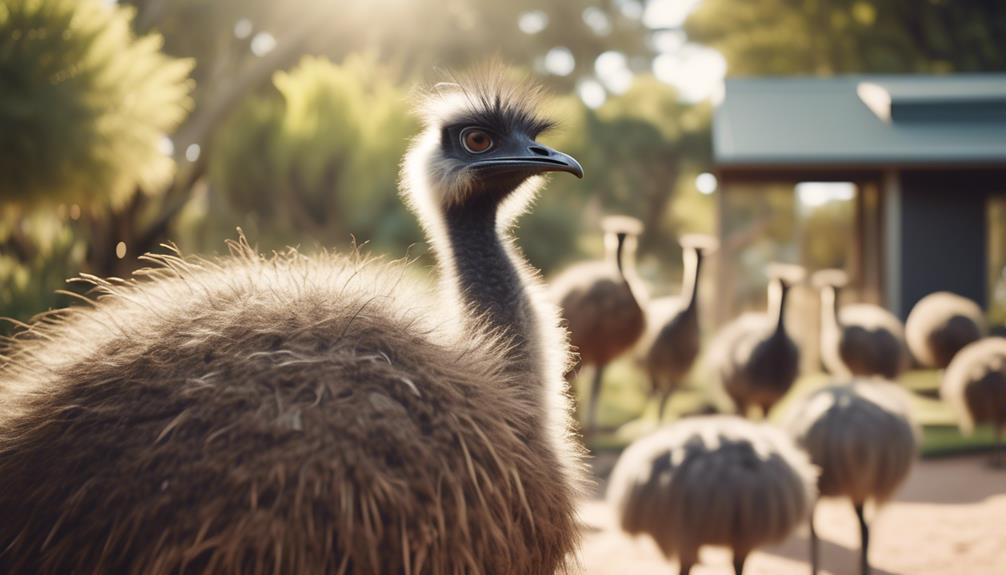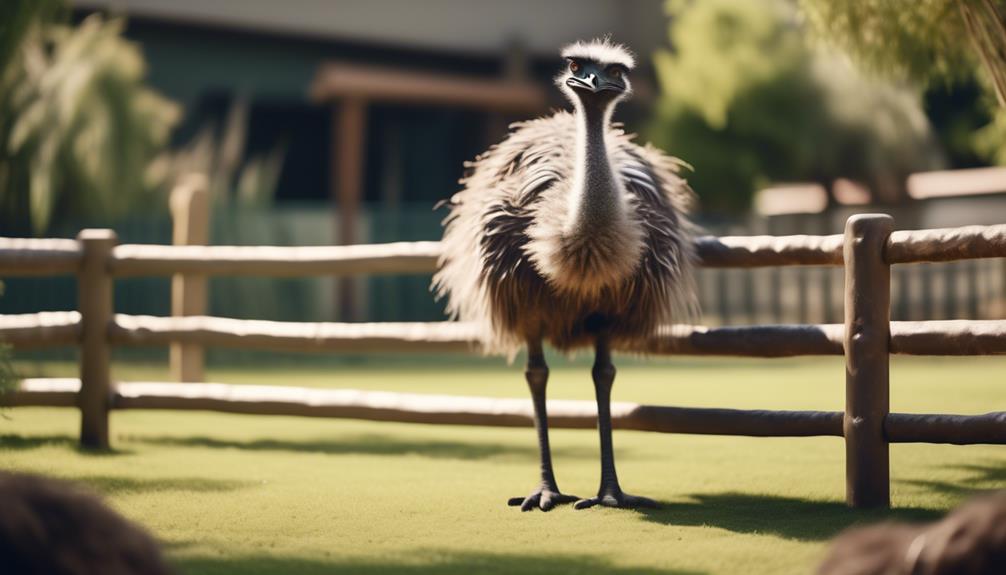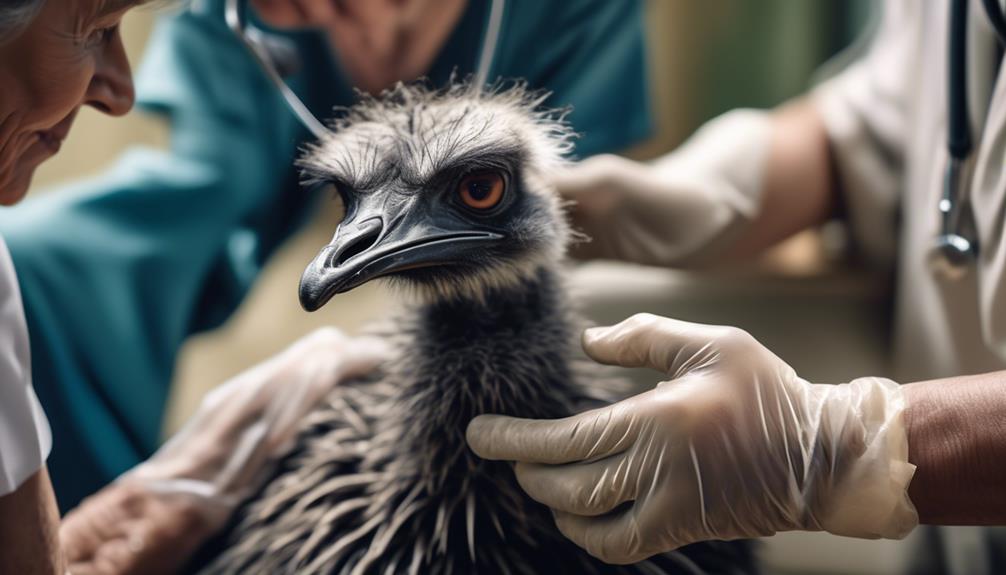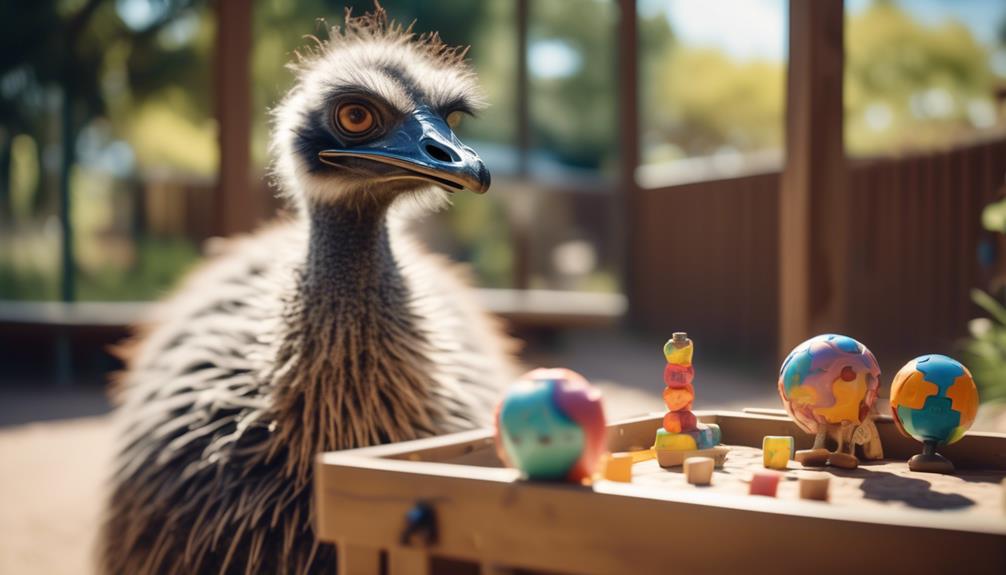
Caring for elderly emus can be a monumental task, as these majestic creatures require special attention and considerations to ensure their well-being.
As an emu caregiver, you will need to navigate through a multitude of challenges, from understanding the aging process to addressing health issues and providing mental stimulation.
With their unique needs and vulnerabilities, elderly emus rely on your expertise and dedication to create an environment that promotes their comfort, mobility, and overall quality of life.
But where do you begin? Let's explore the essential aspects of caring for elderly emus, from their diet and exercise to their living conditions and professional support.
Key Takeaways
- Emus have unique health needs and require regular veterinary check-ups and vaccinations to monitor their health.
- Providing a proper diet plan with high-quality emu pellets, fresh fruits and vegetables, and appropriate supplements is crucial for the overall health of elderly emus.
- Regular exercise opportunities, mental stimulation, and socialization with other emus or compatible animals are essential for the well-being of elderly emus.
- Creating a comfortable living environment with shelter, secure fencing, ample vegetation, clean water, and enrichment activities is important for the comfort and happiness of elderly emus.
Understanding Emu Aging Process
As emus age, it's important to understand the changes they go through in order to provide them with the best possible care and support. Emus have an average lifespan of about 15 to 20 years, although some individuals have been known to live up to 30 years in captivity. Like any living being, emus experience age-related changes that may affect their overall well-being.
One of the most notable age-related changes in emus is a decrease in activity levels. As they get older, emus tend to become less active and may require more rest. It's essential to create a comfortable and safe environment for them, with ample space to move around and soft bedding to support their aging bodies. Providing them with a sheltered area where they can retreat from extreme weather conditions is also crucial.
Another common change in elderly emus is a decline in their digestive efficiency. Their metabolism slows down, and they may have difficulty absorbing nutrients from their food. Adjusting their diet to include more easily digestible foods and providing them with supplements such as vitamins and minerals can help support their nutritional needs.
Additionally, as emus age, their immune system may weaken, making them more susceptible to diseases and infections. Regular veterinary check-ups and vaccinations are essential to monitor their health and prevent potential illnesses.
Understanding these age-related changes in emus allows us to provide them with the care and support they need as they enter their senior years. By being attentive to their changing needs, we can ensure that they live out their golden years with comfort and happiness.
Creating a Proper Diet Plan
Now that you have a better understanding of the age-related changes that elderly emus go through, it's important to focus on creating a proper diet plan for these majestic birds. Emu nutrition plays a vital role in keeping them healthy and thriving as they age gracefully. As caretakers, you play a crucial role in ensuring that their dietary needs are met.
To begin with, it's essential to provide a balanced and varied diet for your elderly emus. Their diet should consist of high-quality emu pellets, which are specially formulated to meet their nutritional requirements. These pellets should be the main component of their diet, providing them with essential vitamins, minerals, and proteins.
In addition to pellets, it's important to incorporate fresh fruits and vegetables into their diet. Emus enjoy a wide range of fruits and vegetables, such as apples, carrots, and leafy greens. These provide important vitamins and minerals that support their overall health.
When it comes to feeding schedule, it's best to offer small meals throughout the day rather than one large meal. This helps in proper digestion and prevents overeating. Additionally, providing fresh, clean water at all times is crucial to keep them hydrated.
Providing Regular Exercise Opportunities

To ensure the overall well-being of your elderly emus, it's essential to provide them with regular opportunities for exercise. Just like humans, emus need physical activity to stay healthy and maintain their mobility.
Here are two important aspects to consider when it comes to providing exercise for your elderly emus:
- Emu socialization: Emus are social creatures, and interaction with their peers is vital for their mental and emotional well-being. Arrange playdates with other emus in a safe and controlled environment. This won't only provide them with exercise but also keep them mentally stimulated as they engage in social behaviors with their companions.
- Outdoor exploration: Emus are naturally curious animals and enjoy exploring their surroundings. Encourage outdoor exploration by creating a spacious and secure outdoor area where they can roam freely. Provide structures and obstacles for them to navigate, such as low hurdles or ramps. This will stimulate their muscles and joints, helping to maintain their strength and flexibility.
Ensuring a Comfortable Living Environment
Creating a comfortable living environment is crucial for ensuring the well-being and happiness of your elderly emus. As these majestic creatures age, they require a space that meets their specific needs and allows them to thrive. The emu habitat should mimic their natural surroundings as closely as possible, providing ample space for roaming and grazing. Emus are social animals, so it's important to consider their socialization needs when designing their living environment.
To give you a better understanding of what your emus' living space should look like, here is a table that outlines the key elements of a comfortable emu habitat:
| Element | Description |
|---|---|
| Shelter | Provide a sheltered area where your emus can seek refuge from extreme weather conditions, such as heat, cold, or rain. |
| Fencing | Emus are large and curious birds, so a sturdy fence is necessary to keep them safe and prevent them from wandering off. |
| Vegetation and Food | Ensure there is plenty of vegetation and suitable food sources available for your emus to graze on. This can include grass, shrubs, and emu-specific feed. |
| Water Source | Emus need access to clean, fresh water at all times. Consider installing a large, shallow water dish or a small pond for them to drink, bathe, and cool off in. |
| Enrichment Activities | Emus benefit from mental stimulation, so provide items such as logs, branches, and balls for them to peck at and interact with. |
| Socialization Space | Emus are social animals and thrive when they have companionship. Ensure there is enough space for them to interact and establish social hierarchies within their group.
Monitoring and Managing Emu Health

As you continue to prioritize the well-being of your elderly emus, it's essential to focus on monitoring and managing their health to ensure they live a fulfilling and comfortable life. Regular check-ups are crucial in maintaining their overall well-being.
Here are some important considerations to keep in mind:
- Schedule regular check-ups with an experienced avian veterinarian who can provide specialized care for your emus. Emus have unique health needs, and a professional can help detect any underlying issues early on.
- Familiarize yourself with the signs of illness in emus. These may include decreased appetite, lethargy, abnormal droppings, difficulty breathing, or changes in behavior. Being proactive and observant allows you to catch potential health problems before they worsen.
Recognizing signs of illness in emus can be challenging, as these birds are known for hiding discomfort. However, establishing a close bond with your emus can help you notice subtle changes in their behavior or appearance. Spend time observing them daily, paying attention to any deviations from their normal patterns.
Addressing Mobility and Joint Issues
Addressing mobility and joint issues in elderly emus requires careful attention and proactive measures to ensure their comfort and overall well-being. Just like humans, emus can experience mobility challenges and joint problems as they age. As a caring and dedicated emu owner, it's essential to be aware of these issues and take appropriate steps to assist your emu in maintaining their mobility and reducing discomfort.
One effective way to address mobility and joint issues in elderly emus is through emu physical therapy. This therapy involves a range of exercises and movements designed to improve joint flexibility, strengthen muscles, and enhance overall mobility. By incorporating regular physical therapy sessions into your emu's routine, you can help them maintain their independence and reduce the risk of further joint complications.
To assist with emu mobility, you can also make some modifications to their environment. Ensuring that their living space is spacious, well-padded, and free from any obstacles or hazards can greatly enhance their ability to move around comfortably. You can also consider providing ramps or gentle slopes to help them navigate over any height differences with ease.
Promoting Mental Stimulation and Enrichment

Maintaining their mobility and reducing discomfort is crucial for the well-being of elderly emus. Another important aspect to consider is promoting mental stimulation and enrichment to enhance their overall quality of life.
Just like humans, emus also need activities that stimulate their minds and provide emotional well-being. Here are some ways you can promote mental stimulation and enrichment for your elderly emu:
- Provide interactive toys: Emus are curious creatures and providing them with toys that they can interact with can help keep their minds sharp. Look for toys that encourage problem-solving or puzzle-solving skills.
- Encourage social interaction: Emus are social animals and thrive in the company of others. Arrange playdates with other emus or even introduce them to other compatible animals. This won't only provide them with mental stimulation but also help fulfill their need for social interaction.
Emu playdates: Arrange playdates with other emus in your area. Let them interact and engage in activities together.
Introduce compatible animals: Consider introducing your emu to other animals, such as goats or chickens, that they can socialize with under supervision.
Seeking Professional Support and Guidance
To ensure the best care for your elderly emu, it's important to seek professional support and guidance from experienced veterinarians or animal care specialists. Professional consultation is crucial when it comes to the health and well-being of your beloved emu. As emus age, they may develop unique health issues or require specialized care. These professionals can provide valuable advice on nutrition, exercise, and overall management of your elderly emu's specific needs.
Emotional support is also an essential aspect of caring for elderly emus. Just like humans, emus may experience age-related changes that can affect their emotional well-being. Seeking guidance from professionals who understand the emotional needs of these majestic birds can ensure that they receive the proper care and attention. These experts can offer strategies to provide comfort and promote mental stimulation for your aging emu.
When choosing a veterinarian or animal care specialist, look for someone with experience in avian care, specifically emus. They should have a deep understanding of the unique physiology and behavior of emus, as well as the challenges that come with their aging process. Establishing a trusting relationship with a knowledgeable professional can give you peace of mind and provide the best possible care for your elderly emu.
Frequently Asked Questions
How Can I Help My Elderly Emu Cope With Loneliness or Depression?
Getting another emu can be a viable option to alleviate your elderly emu's loneliness or depression. Providing extra attention and affection can also help improve their mental well-being. They need emotional support just like humans do.
Are There Any Specific Toys or Activities That Can Help Keep My Elderly Emu Mentally Stimulated?
To keep your elderly emu mentally stimulated, consider providing them with mental enrichment activities and toys. These can help keep their mind active and engaged, reducing boredom and promoting overall well-being.
What Are Some Signs That My Elderly Emu May Be Experiencing Pain or Discomfort?
If your elderly emu is experiencing pain or discomfort, it's important to be aware of the signs. Look for changes in behavior, decreased appetite, and reluctance to move. Managing pain in elderly emus requires careful observation and veterinary guidance.
How Can I Prevent My Elderly Emu From Developing Obesity or Other Weight-Related Health Issues?
To prevent your elderly emu from developing weight-related health issues, it's crucial to establish a balanced and tailored exercise routine. Regular walks, gentle stretches, and controlled feeding portions can help maintain their overall well-being and prevent obesity.
Is There a Recommended Age at Which I Should Start Making Adjustments to My Emu's Living Environment to Accommodate Their Aging Needs?
As your emu ages, it's important to consider making adjustments to their living environment. The recommended age for these adjustments depends on the individual emu and the effects of aging on their specific needs.
Conclusion
Congratulations on becoming an expert in the art of elderly emu care! With your newfound knowledge, you can now provide your feathered friends with the royal treatment they deserve.
From crafting a customized diet plan to ensuring a comfortable living environment, you're equipped to meet their unique needs. Remember, when it comes to caring for elderly emus, it's all about giving them the love and attention they deserve.
Keep up the fantastic work, and may your emus live long and prosper!




